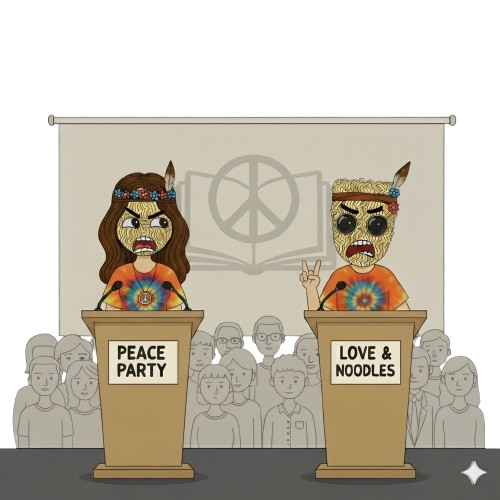Welcome to Noodles of Asia ! - A Woke Noodle Blog
The Great Distraction: How Politicians Use Culture Wars to Sow Division and Enrich the Elite
Uncover how politicians in 2025 use culture wars to divide neighbors and distract from economic plunder in our blog post at NoodlesOfAsia.com. From book bans to pronoun debates, these manufactured conflicts keep citizens fighting while elites secure billions in tax breaks. Learn how this tactic fuels inequality, leaving communities to suffer, and discover ways to unite for economic justice. #EndTheDistraction
Woke Noodles - NoodlesofAsia.com
6/15/20254 min read


Across America, neighbors who once shared barbecues now glare at each other over debates about pronouns, book bans, or border security. Families avoid holiday gatherings, split by arguments over critical race theory or abortion rights. Meanwhile, as citizens trade insults—calling each other "woke" or "bigoted"—politicians quietly pass laws that funnel billions in tax breaks to their wealthy donors and themselves. This is no accident; it’s a calculated strategy. Culture wars are a deliberate distraction, designed to pit us against one another while the elite plunder public resources. In this 1,500-word exposé, we’ll uncover how politicians in 2025 use social divisions to mask economic theft, leaving ordinary citizens to suffer the consequences.
The Mechanics of the Culture War
The term "culture war" gained traction in the 1990s, coined by sociologist James Davison Hunter to describe clashes over values like family, education, and identity. Today, it’s a political weapon. Conservatives rail against "woke" corporations, transgender rights, or drag queen story hours, while progressives condemn systemic racism, abortion bans, or voter suppression. These issues dominate news cycles, from Florida’s "Don’t Say Gay" law to battles over Confederate monuments.
But why do these topics explode at specific times? Politicians amplify them strategically. For example, in 2023, Florida Governor Ron DeSantis targeted New College with a conservative overhaul, framing it as a stand against "woke indoctrination." Critics argue this distracted from economic policies favoring corporate interests. Similarly, the 2017 Tax Cuts and Jobs Act under former President Donald Trump slashed corporate taxes from 35% to 21%, benefiting billionaires, while media fixated on NFL players kneeling or transgender bathroom debates.
Culture wars are fueled by a well-funded ecosystem. Billionaires like the Koch brothers or George Soros bankroll think tanks, super PACs, and media campaigns that amplify divisive issues. A 2021 American Enterprise Institute report notes that culture wars exploit race and identity to obscure elite-worker tensions. As former Labor Secretary Robert Reich has said, "Culture wars are manufactured to create fear of the 'other,' diverting attention from economic looting by the oligarchy."
Turning Neighbors into Enemies
The tragedy of this tactic is how it fractures communities. In small towns, school board meetings turn into battlegrounds, with parents labeling each other "groomers" or "racists" over curriculum changes. Social media algorithms worsen this, feeding users outrage content that deepens echo chambers. A 2022 Guardian article explains how these manufactured controversies divide people who share economic struggles, distracting from policies that favor low taxes and deregulation for the wealthy.
In Ohio in 2024, Trump’s anti-immigrant rhetoric rallied crowds while his policies were criticized for ignoring wage stagnation and inequality. Neighbors who once collaborated on community projects now distrust each other, divided by wedge issues like gender identity or abortion—issues that, while significant, affect daily life far less than healthcare costs or job losses. This division cripples collective action. When citizens are busy hating their neighbors, they’re less likely to unite against policies that harm everyone, like tax breaks for the ultra-rich, a trend rooted in the 1980s shift toward trickle-down economics.
The Real Agenda: Economic Plunder
Behind the culture war noise, politicians pass legislation enriching their donors. The 2017 tax cuts added $1.9 trillion to the deficit, primarily benefiting the top 1%, including many political contributors. While these bills passed, media obsessed over cultural flashpoints, ensuring little scrutiny. States mirror this pattern: in 2022, Georgia and Texas used tax policy to punish companies for social stances while granting breaks to political allies, all amid debates over "woke" corporations.
Both parties play this game, though evidence suggests Republicans lean harder into culture wars. A 2019 Guardian piece notes Trump’s focus on cultural divisions to avoid class-based discussions, favoring media-driven outrage over wealth distribution. A 2024 Medium post calls this a "bait-and-switch," where debates over diversity, equity, and inclusion (DEI) mask billionaire tax avoidance. In 2025, with income inequality at historic highs—the top 1% now hold more wealth than the middle class—legislation deregulating industries for donors slips through while headlines focus on book bans or pronoun policies.
The Cost to Citizens
While elites celebrate tax windfalls, ordinary Americans bear the burden. Chronic underinvestment in public services leads to crumbling bridges, overcrowded schools, and unaffordable healthcare. The U.S. infrastructure earned a C- in the 2025 American Society of Civil Engineers report, blamed on diverted funds amid tax cuts. Healthcare costs continue to soar, with millions uninsured, yet public discourse fixates on cultural battles rather than universal coverage.
Economic inequality drives deeper crises: rising poverty, opioid addiction, and suicide rates. A 2021 Georgetown analysis compares the U.S. to China, noting that culture wars overshadow class struggles despite growing wealth gaps. Even conservative voters, as seen in 2025 Quora discussions, are manipulated by media to fear cultural shifts over economic exploitation. A 2023 Common Dreams op-ed argues that far-right culture wars distract the working class from oligarchic gains, leaving communities fractured and powerless.
Why This Tactic Succeeds
This strategy exploits human psychology. Fear and tribalism outweigh rational economic concerns, and politicians know it. Media outlets profit by amplifying outrage, as algorithms prioritize divisive content. Emotional issues like abortion or gun rights mobilize voters more than complex tax policy debates. A 2024 Politico article warns that culture wars could escalate into real conflict, but others see them as cynical ploys to protect elite interests.
Some conservatives argue culture wars reflect genuine value clashes, not just distractions. Yet, the evidence points to economic motives: bills favoring donors pass with minimal pushback when the public is distracted. The cycle is self-perpetuating—division breeds more division, leaving citizens too fragmented to challenge the status quo.
Breaking Free from the Distraction
To dismantle this machine, we must see through the ruse. Focus on shared struggles: unaffordable healthcare, stagnant wages, and crumbling infrastructure affect everyone, regardless of cultural stance. Engage neighbors with empathy, not anger—many "opponents" share your economic frustrations. In 2025, with midterm elections approaching, support candidates who prioritize economic justice over divisive rhetoric, whether they’re progressive or conservative.
Grassroots action can shift the narrative. Organize community forums to discuss tax fairness or infrastructure funding, bypassing cultural traps. Demand transparency on political donations—follow the money to expose who benefits from division. Platforms like NoodlesOfAsia.com, which uses universal symbols like ramen to unite people, offer creative ways to spread awareness. Imagine a campaign where noodle packets carry messages about tax inequality, shared in grocery stores or online with #EndTheDistraction.
The next time a politician rants about cultural threats, ask: What economic policy are they sneaking through? Your neighbors aren’t the enemy—the system turning you against them is. By rejecting manufactured hate and focusing on shared economic needs, we can demand accountability and build a future where the wealth of our nation serves its people, not just its elite.
